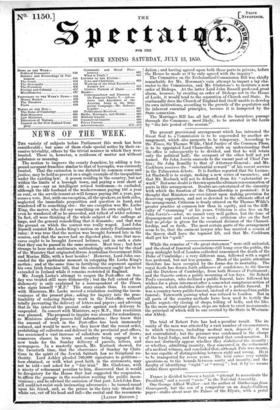NEWS OF THE WEEK.
Tin variety of subjects before Parliament this week has been considerable ; but some of them elude special notice by their ex- cessive triviality, others by the trivial manner in which they were treated. There is, however, a residuum of matter not without substance or meaning. The motion to improve the county franchise, by adding a ten- pound occupant franchise similar to that of boroughs, was curiously treated. That the extension is one dictated by common sense and justice, may be held as proved on a single example of the inequalities under the existing law. A person residing in the country, but not
within the limits of a borough town and Flaying a rent short of 501. a year—say an intelligent retired tradesman—is excluded, although the idle husband of the washerwoman paying 101. a year as rent, or the servile tenant-at-will farmer paying 50l. a year, pos- sesses a vote. But, with oneexception, all the speakers, on both sides, neglected the immediate proposition and. question in hand, and wandered off to something else : the one exception was Mr. Locke King, the mover, who did say something on his own subject; but even he wandered off as he proceeded, and talked of wider reforms. In fact, all were thinking of the whole subject of the suffrage at large, and the general remodelling that it demands ; and that was the ground on which the contest was really waged. Lord John Russell resisted Mr. Locke King's motion on strictly Parliamentary rules : it was true that the motion was brought forward late in the session, and that the mover had no digested plan ; true that mea- sures ought to be brought forward. betimes, and in such a state that they can be passed in the same session. Most true ; but how strange to hear such sentiments unblushingly uttered by the chief of the Ministry that originated divers Australian Government Bills and Marine Bills, with a host besides! However Lord John suc- ceeded for the particular moment in estopping However, Locke King's motion; and at the same time in fortifying the argument against his own Irish franchise bill, that the constituency ought not to be extended in Ireland while it remains restricted in England. Mr. Joseph Locke's attempt to reopen the Post-office on Sun- day was treated still more dishonestly ; but the full extent of the dishonesty is only explained by a correspondent of the Times, who signs himself " M.P." The story stands thus. In concert with Ministers, Mr. Locke moved a resolution reciting the incon- venience of the present plan ; asking for inquiry into the prac- ticability of reducing Sunday work in the Post-office without totally preventing the delivery of letters and papers ; and advising that in the interval the present order against such delivery be suspended. In concert with Ministers, says M.P., that resolution was planned. The proposal to inquire was absurd for redundancy, as Ministers already possess full information : they know that the amount of work in the Post-office has been immensely reduced, and would be more so ; they know that the recent order, prohibiting all collection and delivery in the provincial post-offices, has occasioned a vast increase of substitute work out of doors ; numerous classes in town and country being engaged in a new trade for the Sunday delivery of parcels, letters, and newspapers. In a masterly speech, Mr. Roebuck showed, for the twentieth time, that the observance of Sunday by Chris- tians in the spirit of the Jewish Sabbath has no Scriptural au- thority. Lord Ashley pleaded 700,000 signatures to petitions— how obtained or with what good faith in the statements, ma not be told—and. asked for a "fair trial." Mr. Gladstone, wit a nicety of refinement peculiar to him, discovered that it would be derogatory for the Rouse that had suggested the suspension, to affirm thee the resolution reciting the public incon- venience ; anir:ised the omission of that part. Lord John Rus- sell could not resist such insinuating adversaries : he turned round upon his friend, and, as the prince in the fairy talc tteated the white eat, cut off his head and —the recital and the recommen-
dation ; and having agreed upon both those parts in private, before the House he made as if he only agreed with the inquiry !
The Committee on the Ecclesiastical Commission Bill was chiefly remarkable for Mr. Horsman's vain attempt to impart a lay cha- racter to the Commission, and Mr. Gladstone's to institute a new order of Bishops. At the latter Lord John Russell professed great alarm, because, by creating an order of Bishops not in the House of Lords, it would tend to the separation of Church and State. So continually does the Church of England find itself unable to develop its own institutions, according to the growth of the population and its inherent essential principles, because it is hampered by the State connexion.
The Marriages Bill has all but effected its hazardous passage through the Commons ; most likely, to be arrested in the Los by "the late period of the session."


























